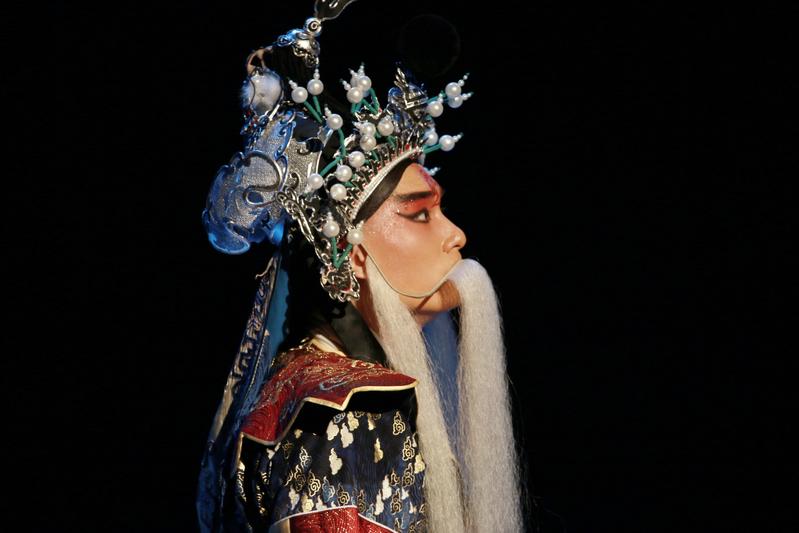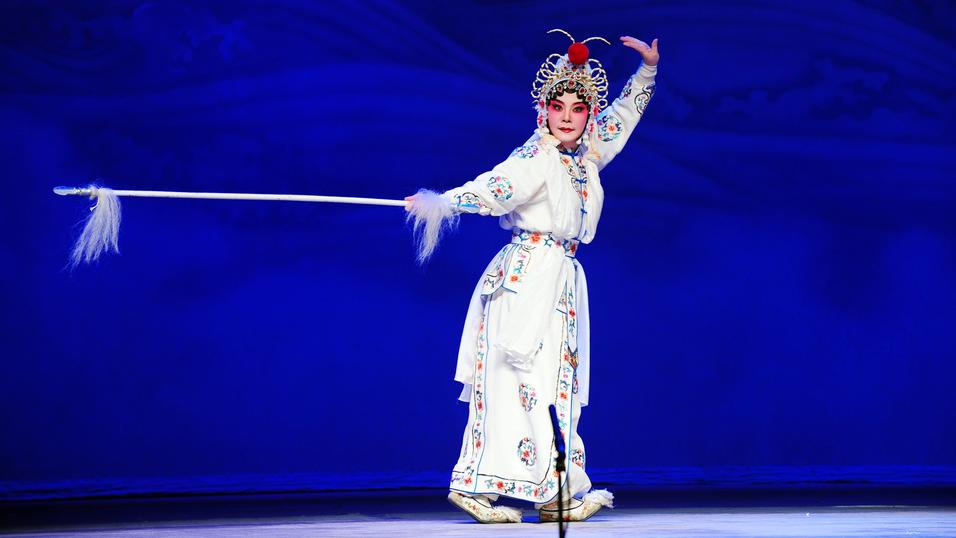 Actor Liu Heng performs in the latest Kunqu Opera, A Commander's Introspective, produced by the Northern Kunqu Opera Theatre. (PHOTO PROVIDED TO CHINA DAILY)
Actor Liu Heng performs in the latest Kunqu Opera, A Commander's Introspective, produced by the Northern Kunqu Opera Theatre. (PHOTO PROVIDED TO CHINA DAILY)
Long drawn-out tunes, poetic language, lithe movements and exquisite attire… all that Kunqu, a type of traditional Chinese opera, presents on stage can come down to its overwhelming beauty, which has fascinated generations.
Originating from Kunshan in Suzhou some 600 years ago, Kunqu's creation and evolution has absorbed nourishment from the local culture
"Kunqu is beautiful, because it combines the very essence of various art forms, including poetry, songs, dances and music," said Wang Fang, a Kunqu master who has twice won the Plum Performance Award, China's top award for theater and opera performances.
Originating from Kunshan in Suzhou some 600 years ago, Kunqu's creation and evolution has absorbed nourishment from the local culture. It is regarded as one of the oldest performing arts in China, which has influenced many other traditional opera types, such as Peking Opera.
In contrast with other traditional opera types, which Wang termed "square art" because they were staged in much larger public spaces, Kunqu used to be performed in the lobbies or private gardens of the powerful and wealthy in ancient China, and is thus known as "court-like performance", Wang said.
Being in such a close proximity to the audience, Kunqu features a delicacy and gentleness in its performance style, she noted.
When Wang and her colleagues performed abroad, the audiences were taken in by the charm of Kunqu. As a result, the audiences requested that English subtitles for the audience be removed so they could focus attention on performance, Wang said.
On these occasions, before the start of the performance, a guide will introduce the story and the highlights of the show, helping the audience better understand and appreciate the classic art, she added.
 Gu Haohao, director of Shanghai Kunqu Opera Troupe, performs in Legend of the White Snake. (PHOTO PROVIDED TO CHINA DAILY)
Gu Haohao, director of Shanghai Kunqu Opera Troupe, performs in Legend of the White Snake. (PHOTO PROVIDED TO CHINA DAILY)
Turnaround in market
Wang has immersed herself in the art for many years. She began learning from noted Kunqu performers at the age of 14 in 1977. Since then the Suzhou native has witnessed the ups and downs of the traditional art.
From the 1980s to the 1990s, when Chinese people were dazzled with a sudden influx of modern entertainment and driven into karaoke bars and discos, Kunqu once faced an embarrassing situation: performers on stage outnumbered the theater audience, Wang recalled.
While the bleak economic outlook dissolved many local traditional opera troupes, the Suzhou Kunqu Opera Theatre, where Wang worked, survived.
ALSO READ: Young artists deliver commanding Kunqu Opera performance
Wang had worked part time as a makeup artist at a local wedding photography studio for a living, yet her love of performing made her persist in her theatrical career, even when Kunqu was at a low ebb.
Kunqu was listed among the UNESCO intangible heritage in 2001, which provided an opportunity to revive the traditional art.
As attention grows on Kunqu, the government is providing greater support for the recovery of the art and related troupes.
In the early 2000s, Wang said she was concerned with the recruitment of Kunqu performers. A few years later, her concern shifted to fostering "soil of the art-the audience".
An increasing number of young people have joined the fans of Kunqu for their taste in the traditional art
A Kunqu training center was founded in Suzhou in 2007 to spark interest among teenagers. The center organizes more than 100 performances annually. It also cooperates with interested primary and secondary schools, providing training in Kunqu performance and appreciation to children at their campuses.
The children can influence their families and their neighborhoods, bringing about change in market prospects, Wang said.
Seeds planted in childhood have blossomed, with many of the trainees embarking on the professional path and the rest staying loyal to the art.
"With our society progressing, the demand for cultural consumption is growing," Wang noted.
An increasing number of young people have joined the fans of Kunqu for their taste in the traditional art. Because they are well-educated, they can understand what the libretti-or the majority of them-in a Kunqu opera mean, Wang said.
Even in a case where lyrics are not understood, young people tend to have the desire to experience or learn about the unknown, she added.
Also, the country's economic prosperity has brought back the faith in national culture, she noted. "After experiencing a smorgasbord of entertainment from abroad, more Chinese have come to realize the value of our heritage."
Inheritance & innovation
In the inheritance of Kunqu, it is crucial to understand what the cream of the traditional art is, Wang said. Only after that, with improved artistic expertise, well-cultured taste and sharp judgment, can come innovation in a proper manner. Otherwise it would bring about damage to the heritage, she noted.
READ MORE: New performances delight HK with the magic of Kunqu
"Innovation requires expertise in and profound understanding of the art," she said.
Wang likes reading books on psychology and reflects on what she has learned from these books and from life on her stage creations.
"Kunqu is like biluochun (a type of tea prevailing in Suzhou)-it is not that strong and tastes seemingly light but its lingering flavor can always capture your heart," she said. "The longer you reflect on it, the more impressive its aftertaste will stay in your memory."


